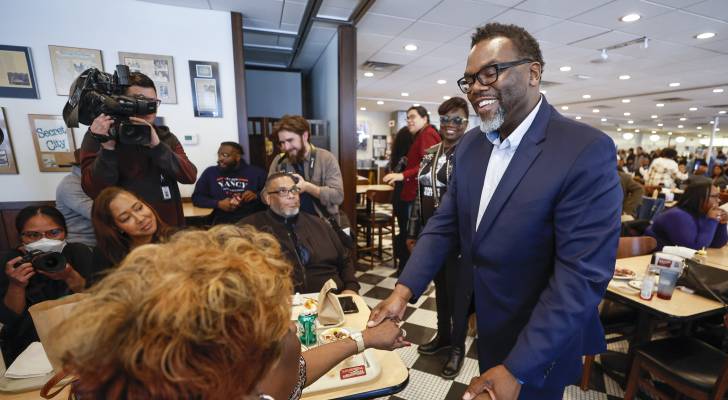The mayor’s office says it would be the first major U.S. city to enact such a plan.
Food, shelter, water, power shouldn’t he for profit.
I’ll toss in that I’m fine with the luxurious versions of those things being for profit where it applies. But that’s the rub, the ruling class is probably going to define anything past a cardboard box and gruel as “luxury.”
Hmm… products and services still cost the same but now there are less people in the chain to make a profit.
Sounds like a win-win for me.
If there are less people In the chain, shouldn’t everything cost less?
That’s what they’re saying. Wholesale price is the same, retail should go down due to less people in the chain.
They just phrased it poorly.
you would think so
I was referring to the overall cost of products, like what the businesses pay to bring them to market.
Yes, things should cost less for customers because businesses are making less profit.
Small town in Kentucky did a similar thing with a municipally ran gas station.
Main streets with Mom and Pop stores are really nice. It seems like you’d get more soul from than a government store. But I don’t know how you would incentive then sufficiently, as it’s really tough to run a small storefront when competing with online.
Problem with mom and pop stores is the owners are still operating to maximize profit.
This intrinsically involves giving the least while charging the most. They’re going to be screwing everyone over as much as they can, while hiding behind the ‘mom and pop’ shield.
It’s funny how the solutions for the failures of capitalism often end up looking just like socialism
There are less than 6500 food deserts in the country. Having access to cheap healthy food is available to the vast majority of people living in the US. We’re talking edge cases, capitalism has been quite successful with the food supply chain here.
Do you think 6500 is a low number? It’s not like each food desert affects only one person each. More likely than not, each is affecting more than a thousand people. Especially in a population dense area like Chicago. We are talking millions of people living in food deserts.
Also, after reading a bunch of your comments, I’m not sure you are fully aware of what a food desert is. But hey, that’s Capitalism.
About 5% of the population. Whereas the rest enjoy the best supermarkets on the planet. This should be about fixing the edge cases, not trying to pretend we don’t have amazing choice and wealth in food for the vast majority.
So you’re talking about “edge cases” and also claiming it effects over 17 million Americans. That’s a lot of human suffering.
We should strive to improve. But the modern food system which is overwhelmingly capitalist has produced the most food secure system to the most people ever. Calling it a failure over 5%, especially without context and scope is foolish.
The modern food system is not capitalist. We extensively subsidize farming, so that farmers will produce excesses despite a lack of corresponding market demand. This socially-funded excessive production is the foundation of our food security.
Capitalism does not produce such a system. Capitalism sees production in excess of actual demand as wasteful, and seeks to eliminate it.
We subsidize farmers, so we don’t have a famine. Has nothing to do with it being socially funded.
Those stores left because of crime. Instead of fixing the root cause of major social issues, their Band-Aid is taxpayer funded stores? Why not just skip the middle man and send food to people directly? Or just set up taxpayer funded food banks. That’s effectively what these “stores” will turn into anyway. This just seems like performative nonsense, not intended to solve anything.
Is it “performative nonsense” because it’s Chicago, or was this city in Florida doing it years ago and this one in Kansas also “performative nonsense,” too?
Why do you think these examples are analogous? The stores in the towns described in the articles you linked didn’t shut down because of poverty or crime. In the examples you provided, collective supermarkets seem to be a good fit. Contrast this with the Chicago mayor, who cites poverty. If people can’t afford food anyway, and the business is going to face sky high theft, the plan doesn’t make sense. Cut out the middle man and just send poor people food. It would cost far less than trying to set up supermarkets from scratch and running them at a loss in perpetuity. Plus it means helping poor people, rather than forcing them to shop lift if they’re hungry.
Lack of shopping opportunities and an inability to pay for food are two separate things. They may often co-occur, but just sending food too poor people doesn’t solve food deserts.
And separately from that, poor people deserve to be able to look at their produce, buy stuff last minute, or browse and buy what strikes their fancy too. All the reasons everyone else uses supermarkets should be available to poor people as well.
If the stores are government run, there is no profit motive. That means lower prices, which means more accessibility for the people who need it.
And who will be sending poor people food? Let me guess, we need to leave it up to churches and charities? Lol
Look at you tripping over yourself to lick the boot. Sad.
If the stores are government run, there is no profit motive. That means lower prices, which means more accessibility for the people who need it.
If these stores are going to be run at a loss anyway, why waste enormous sums of money on premises and other costs when they could just start food banks and give people the food directly? Or, as I suggest above, the government could send people food directly.
I’m suggesting that we give people free food and I’m the boot licker? Okay Bezos.
why waste enormous sums of money on premises and other costs when they could just start food banks
This runs into the problem of charity out-competing potential business ventures. Government subsidized private groceries, or public-private partnerships or just plain government run grocery stores can alleviate the problem of a food desert while still bringing the benefits of an active business to the area. The local government can increase or reduce its investment as needed, and it doesn’t create a service that inherently can’t be competed with by private business in a space that’s already unprofitable/too risky to operate a business within
This runs into the problem of charity out-competing potential business ventures.
But this is moot as the city is planning to run loss-making stores where private stores are non-viable. There is no risk of outcompeting businesses which aren’t even there. And if there is a concern of outcompeting private stores, running stores offering cheaper products than any private store could do so in the area would destroy those businesses just as effectively.
The decision has been made to entirely sacrifice any pretence of private enterprise in the supermarket space in certain areas in Chicago. I’m merely arguing that, given this decision, there are more effectively ways to use public funds.
No, you’re just pushing the tired old, “religious groups and charities should be feeding people, leave the government out of it” bullshit. It doesn’t work.
you’re pushing the tired old… “leave the government out of it” bullshit.
They literally said government was the solution in the message above yours. Regardless of the merits of @JasSmith@kbin.social 's argument, you’ve mischaracterised what they’ve said and that isn’t fair or productive for discussion.
No, you’re just pushing the tired old, “religious groups and charities should be feeding people, leave the government out of it”
I’m literally saying the government should give people free food. You’re arguing with a straw man.





